How Sydney’s Coastal Climate Affects Aluminium Louvre Windows
Sydney’s coastal climate presents unique challenges for aluminium louvre windows. Salt-laden air can accelerate corrosion, while high humidity and intense UV radiation can damage seals and finishes. Understanding these environmental factors is essential for effective maintenance.
Salt Air Exposure
Salt particles in coastal air are highly corrosive to metal surfaces. In Sydney suburbs like Bondi, Manly, and Cronulla, salt build-up can occur within weeks, creating a white powdery residue on aluminium frames. This salt accelerates oxidation and can eventually lead to pitting and structural weakness if not regularly removed.
Humidity and Condensation
Sydney’s humidity levels fluctuate throughout the year, creating condensation that can collect on louvre blades and frames. This moisture, when combined with salt deposits, creates an ideal environment for corrosion. It can also affect the smooth operation of moving parts and damage internal mechanisms if not properly maintained.
UV Radiation Effects
Australia has some of the highest UV levels globally, and Sydney’s clear skies amplify this exposure. Prolonged UV radiation can cause powder-coated finishes to fade and deteriorate, while also breaking down rubber seals and gaskets that keep your louvre windows watertight and energy efficient.
Wind-Driven Rain
Coastal storms in Sydney often bring wind-driven rain that can test the water resistance of louvre windows. Without proper maintenance, water can penetrate through worn seals or corroded areas, potentially causing damage to interior walls and furnishings.
Essential Maintenance Schedule for Coastal Aluminium Louvre Windows
Establishing a regular maintenance routine is crucial for preserving your aluminium louvre windows in Sydney’s harsh coastal environment. Following this schedule will help prevent salt damage and extend the lifespan of your windows.
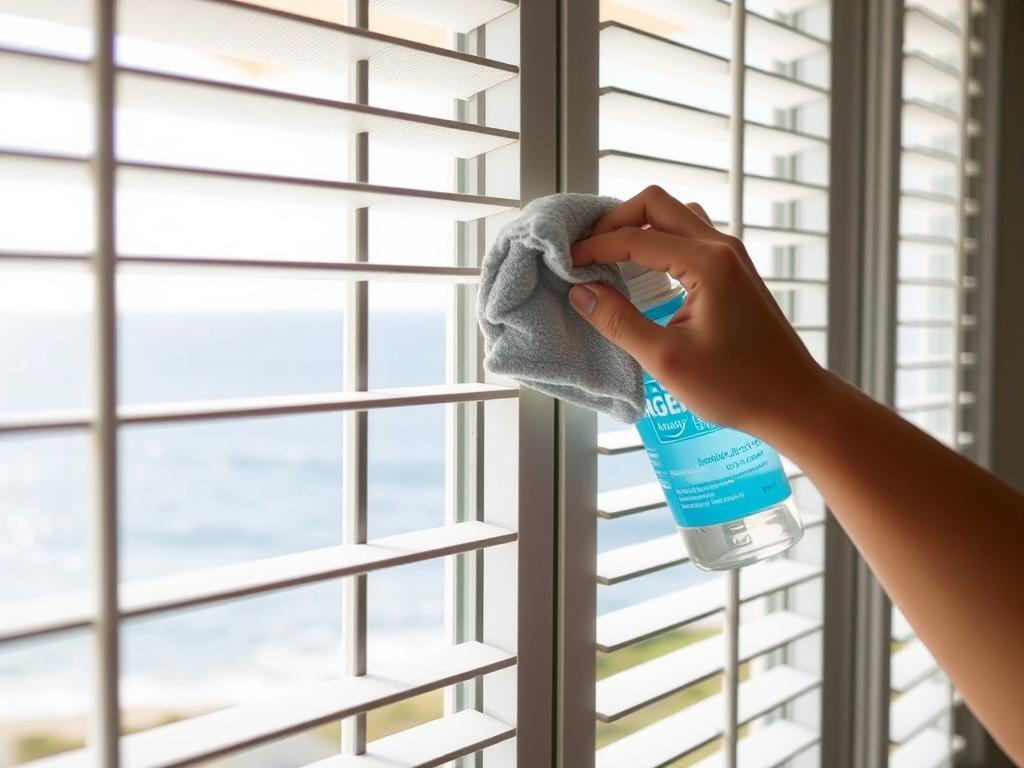
| Maintenance Task | Frequency (General Areas) | Frequency (Direct Coastal <1km) | Importance |
| Fresh water rinse | Monthly | Bi-weekly | Critical |
| Mild detergent cleaning | Every 3 months | Monthly | High |
| Hardware lubrication | Every 6 months | Every 3 months | High |
| Seal inspection | Every 6 months | Every 3 months | Medium |
| Drainage hole cleaning | Every 6 months | Every 3 months | Medium |
| Protective coating check | Annually | Every 6 months | High |
| Professional inspection | Every 2 years | Annually | Medium |
Note: Homes within 500m of the coastline may require even more frequent maintenance due to direct salt spray exposure. Adjust your schedule according to your specific location and conditions.
Proper Cleaning Techniques for Aluminium Louvre Windows
Cleaning is the most fundamental maintenance task for aluminium louvre windows in coastal areas. Using the right techniques and products will prevent damage while effectively removing salt deposits and other contaminants.
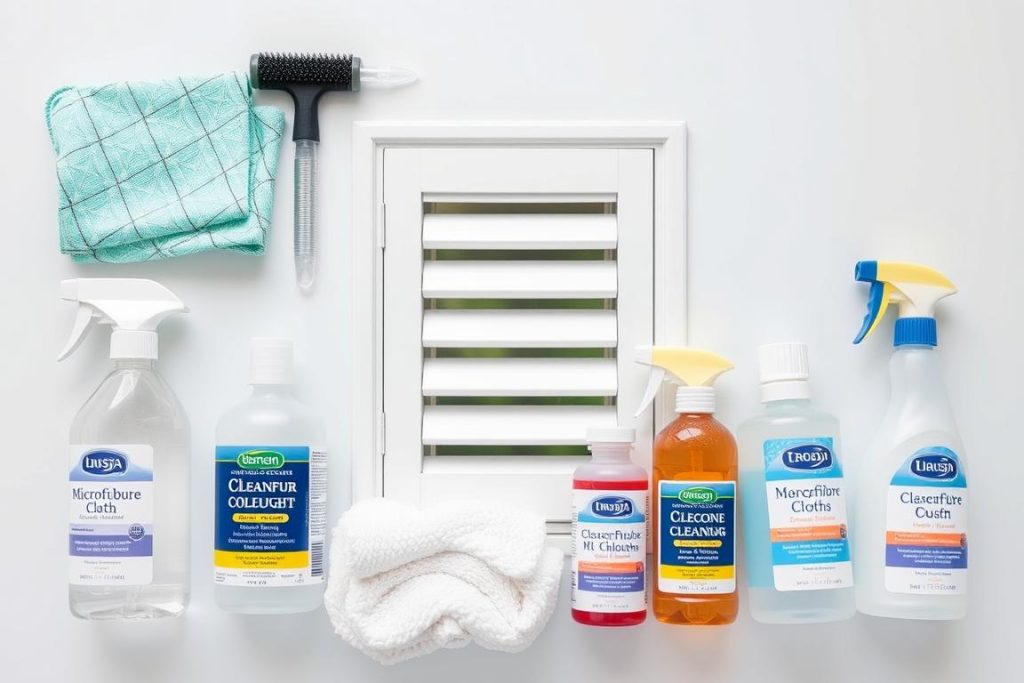
Step-by-Step Cleaning Process
- Prepare the area – Place towels beneath the window to catch drips and remove any loose items from the windowsill.
- Dust removal – Use a soft brush or vacuum with brush attachment to remove loose dust and dirt from all surfaces, including between louvre blades.
- Rinse with fresh water – Gently spray or wipe frames and blades with clean fresh water to remove salt deposits before applying any cleaning products.
- Clean with mild solution – Mix a mild detergent with warm water (1 teaspoon per 4 litres). Never use harsh chemicals, abrasive cleaners, or solvents.
- Wipe each blade – Using a soft microfibre cloth, clean each louvre blade individually, wiping in the direction of the grain for aluminium surfaces.
- Clean tracks and frames – Pay special attention to corners and crevices where salt can accumulate. An old toothbrush works well for hard-to-reach areas.
- Rinse thoroughly – Remove all soap residue with clean water, as leftover detergent can attract more dirt.
- Dry completely – Use a clean, dry microfibre cloth to thoroughly dry all surfaces to prevent water spots and potential corrosion.
“The most important maintenance step for coastal aluminium windows is the regular fresh water rinse. This simple practice removes salt deposits before they can cause damage and extends the time between deep cleanings.”
Warning: Never use high-pressure water systems on louvre windows as this can damage seals and force water into areas it shouldn’t go. Gentle cleaning is always best.
Hardware and Moving Parts Maintenance
The functionality of aluminium louvre windows depends heavily on well-maintained hardware and moving parts. In coastal environments, these components are particularly vulnerable to salt-induced corrosion and seizing.
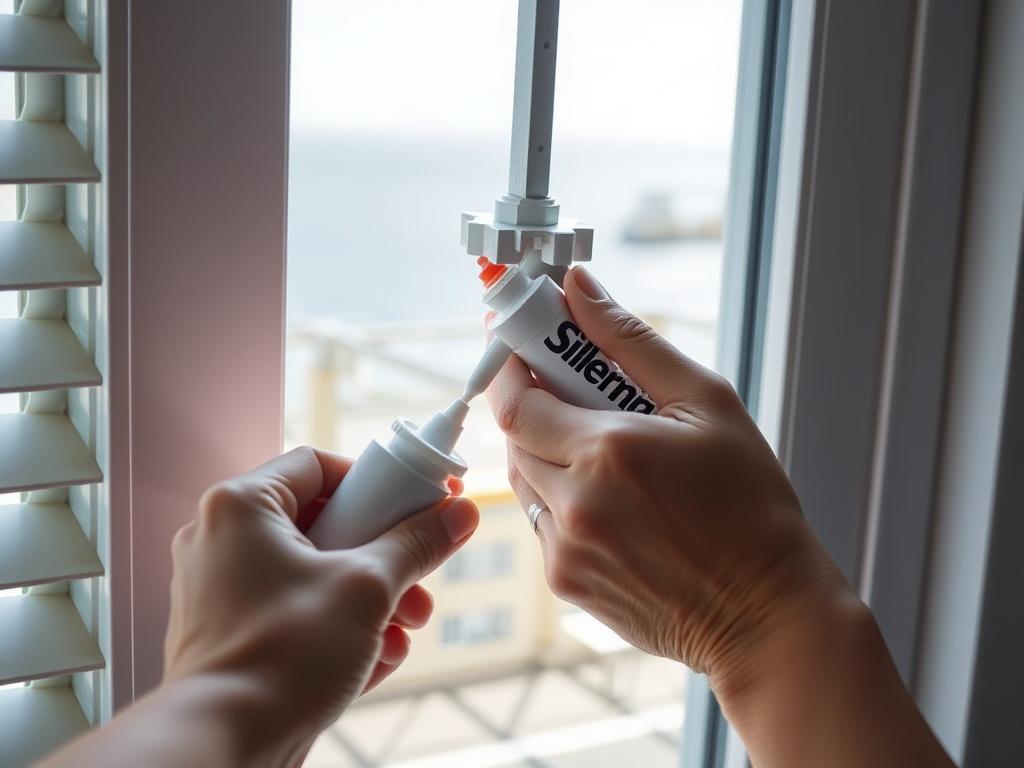
Lubricating Moving Parts
Proper lubrication keeps your louvre windows operating smoothly and protects metal components from corrosion. Apply lubricant every three to six months, depending on your proximity to the coast.
- Use the right lubricant – Silicone-based lubricants or dry PTFE (Teflon) sprays are ideal for coastal environments as they don’t attract dust and sand.
- Focus on pivot points – Apply lubricant to all pivot points where louvre blades connect to the frame.
- Lubricate handles and locks – Ensure smooth operation by applying a small amount of lubricant to handles, locks, and other moving hardware.
- Wipe excess – Remove any excess lubricant to prevent it from attracting dirt or dripping onto window frames or sills.
- Avoid WD-40 – While useful for many applications, WD-40 is not ideal for long-term lubrication of window hardware in coastal areas.
Hardware Inspection and Maintenance
Regular inspection helps identify issues before they become serious problems. Check these components during your maintenance routine:
Clips and Brackets
Inspect clips that hold louvre blades in place for signs of corrosion or loosening. Tighten any loose screws and replace any damaged components promptly to prevent blades from becoming misaligned or falling.
Handles and Operators
Test the smooth operation of handles and winding mechanisms. If you notice increasing resistance, clean thoroughly and lubricate. If problems persist, the internal mechanism may need professional attention.
Need Help With Stubborn Hardware Issues?
Our technicians specialize in repairing and replacing hardware for aluminium louvre windows in Sydney’s coastal areas. We use marine-grade components designed to withstand salt exposure.
Corrosion Prevention and Protection
Preventing corrosion is critical for aluminium louvre windows in Sydney’s coastal climate. While aluminium naturally forms a protective oxide layer, additional measures are necessary in salt-rich environments.
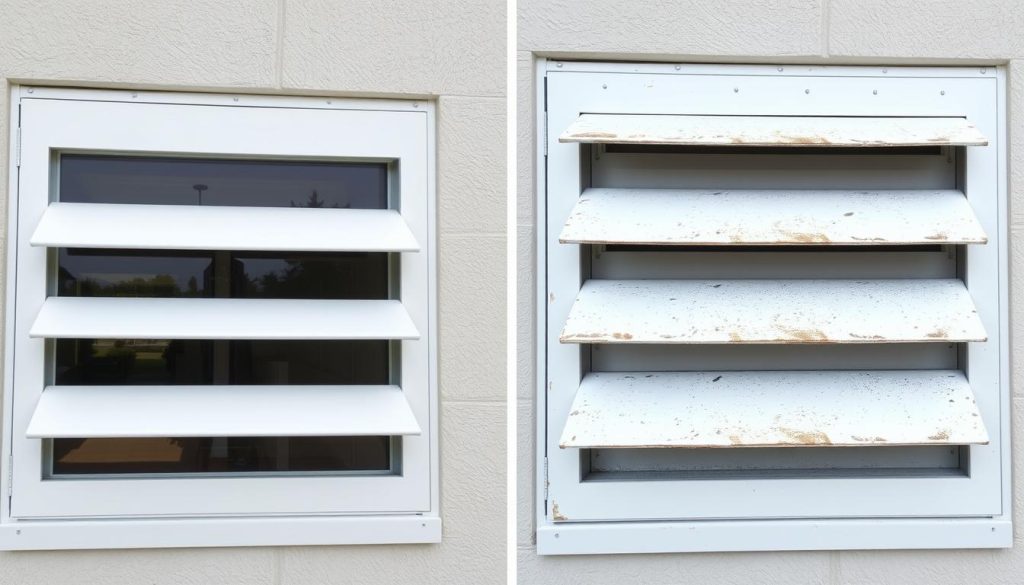
Protective Coatings and Finishes
The right finish on your aluminium louvre windows acts as the first line of defense against coastal corrosion. Understanding your window’s finish helps determine the appropriate maintenance.
| Finish Type | Characteristics | Maintenance Needs | Coastal Suitability |
| Standard Powder Coating | Decorative, available in many colors | Regular cleaning, potential recoating after 7-10 years | Moderate – needs frequent maintenance |
| Marine-Grade Powder Coating | Enhanced durability, salt-resistant | Regular cleaning, potential recoating after 10-15 years | Good – specifically designed for coastal use |
| Anodized Aluminium | Hardened surface, limited color options | Regular cleaning, very durable finish | Excellent – highly resistant to corrosion |
| Kynar/PVDF Coating | Premium finish, excellent UV resistance | Regular cleaning, minimal degradation | Excellent – top choice for severe coastal exposure |
Applying Protective Products
Beyond regular cleaning, applying protective products can significantly extend the life of your aluminium louvre windows in coastal environments.
- Automotive wax – A thin coat of high-quality automotive wax can provide additional protection for powder-coated surfaces. Apply every 6-12 months.
- Corrosion inhibitors – Products specifically designed for marine aluminium can be applied to hardware and exposed metal. Follow manufacturer instructions carefully.
- Protective sprays – Marine-grade protective sprays create an invisible barrier against salt and moisture. Particularly useful for hardware components.
- Frame sealants – Check and reseal any joints or seams where water could penetrate the frame, using appropriate exterior-grade sealants.
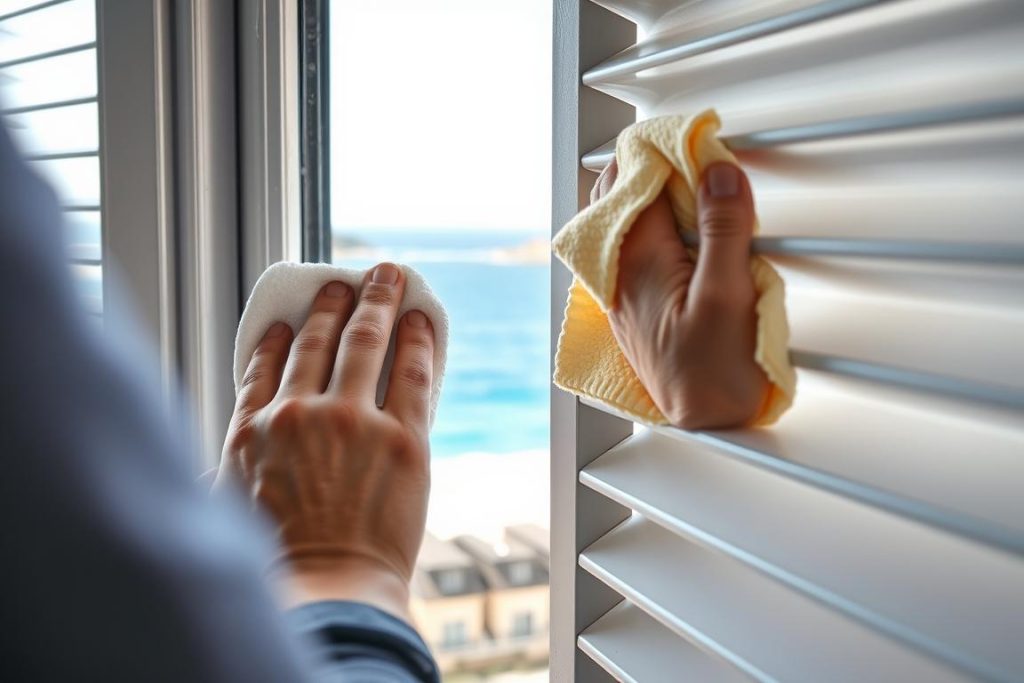
Common Problems and Solutions for Coastal Louvre Windows
Even with regular maintenance, aluminium louvre windows in Sydney’s coastal areas may develop specific issues. Knowing how to identify and address these problems can save you time and money.
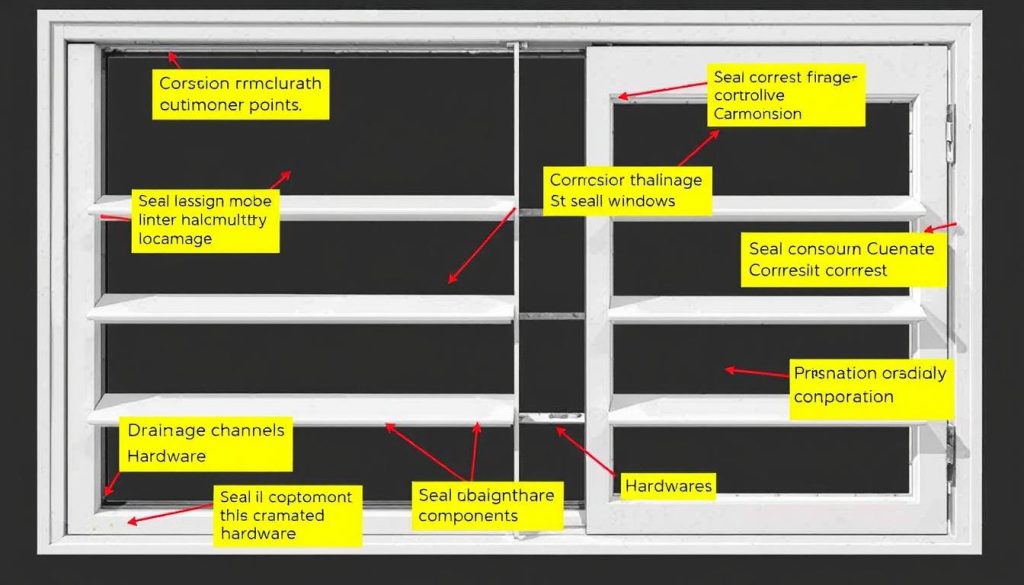
How do I fix sticking or difficult-to-operate louvre blades?
Sticking louvre blades are commonly caused by salt build-up in pivot points or corrosion of moving parts. First, thoroughly clean the window frame and hardware with fresh water and mild detergent. Dry completely, then apply a silicone-based lubricant to all pivot points. If blades still stick, check for misalignment or damaged clips that may need replacement.
What should I do about white powder or spots on aluminium frames?
White powder or spots indicate salt deposits or early aluminium oxidation. For light deposits, clean with fresh water and mild detergent using a soft cloth. For stubborn deposits, mix equal parts white vinegar and water, apply to affected areas, let sit for 5-10 minutes, then rinse thoroughly with fresh water. After cleaning, ensure the frame is completely dry and consider applying a protective wax to prevent future build-up.
How can I stop water leaks during heavy coastal storms?
Water leaks in louvre windows during storms often result from worn seals, blocked drainage channels, or misaligned blades. First, check that all blades close properly and create a tight seal. Clean drainage holes at the bottom of the frame to ensure water can escape. Inspect rubber seals and gaskets for cracks or hardening – these may need replacement. For persistent leaks, a professional assessment may be necessary to identify structural issues.
When should I consider repainting or refinishing my aluminium louvre frames?
Consider repainting or refinishing when you notice consistent chalking (powder when wiped), fading, or areas where the finish has started to peel or bubble. In Sydney’s coastal areas, powder-coated finishes typically last 7-10 years before needing refinishing, while anodized finishes may last 15-20 years. Professional refinishing is recommended for best results, as it requires proper preparation and marine-grade finishes suitable for coastal conditions.
DIY or Professional Help? While regular cleaning and basic maintenance can be handled by most homeowners, issues involving corrosion repair, seal replacement, or refinishing often require professional expertise to ensure proper materials and techniques are used.
When to Seek Professional Maintenance
While regular DIY maintenance is essential, certain situations call for professional expertise, especially for aluminium louvre windows in Sydney’s challenging coastal environment.
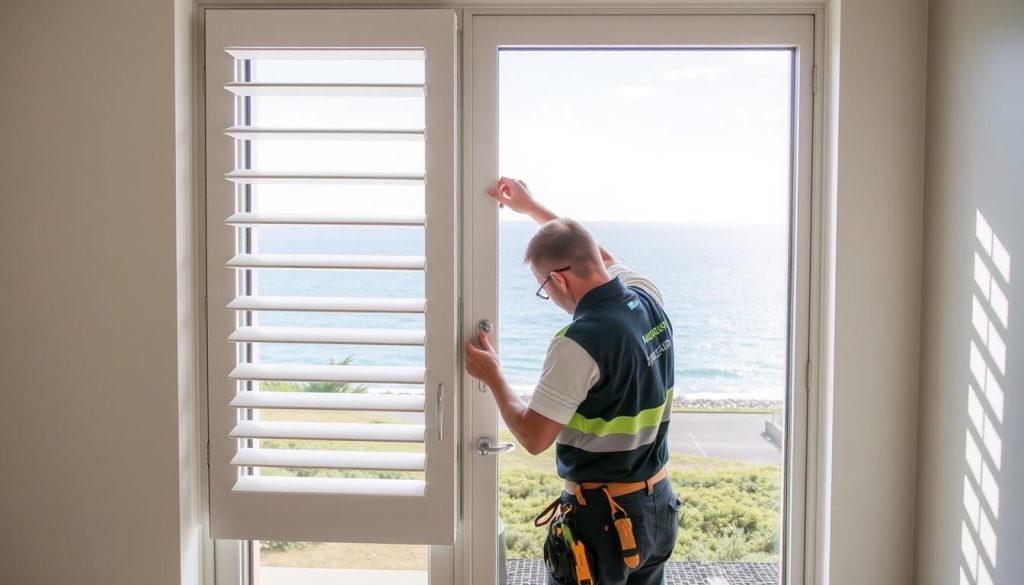
Signs You Need Professional Help
Operational Issues
- Windows that won’t open or close properly despite lubrication
- Broken or severely corroded hardware
- Louvre blades that have become detached or misaligned
- Grinding or unusual noises during operation
Structural Concerns
- Visible corrosion that has penetrated beyond the surface
- Warped or damaged frames
- Persistent water leaks despite basic maintenance
- Gaps between frame and wall or between louvre blades when closed
Finish Problems
- Severe fading, chalking, or peeling of powder coating
- Pitting or etching in the aluminium surface
- Bubbling or blistering in the finish
- Areas where bare metal is exposed to the elements
Preventative Maintenance
- Annual professional inspection for homes within 500m of the coast
- Biennial inspections for homes 500m-5km from the coast
- Professional cleaning and servicing before and after storm season
- Expert assessment before repainting or refinishing
What to Expect from Professional Service
Professional window maintenance specialists offer comprehensive services that go beyond basic cleaning and lubrication:
- Thorough inspection – Detailed assessment of all components including hidden areas like internal drainage systems and frame cavities.
- Hardware servicing – Disassembly, cleaning, and lubricating of operating mechanisms with marine-grade products.
- Seal replacement – Removal and replacement of deteriorated rubber seals and gaskets with UV-resistant materials.
- Corrosion treatment – Professional treatment of corroded areas to stop progression and prevent structural damage.
- Finish restoration – Refinishing services using marine-grade coatings designed for coastal environments.
- Adjustment and alignment – Precise adjustment of louvre blades and operating mechanisms for optimal performance.
Protecting Your Investment in Sydney’s Coastal Climate
Maintaining aluminium louvre windows in Sydney’s coastal climate requires consistent attention, but the rewards are significant: extended window lifespan, improved operation, and preserved aesthetic appeal. By following the maintenance schedule and techniques outlined in this guide, you can protect your investment and continue enjoying the unique benefits that louvre windows bring to your coastal home.
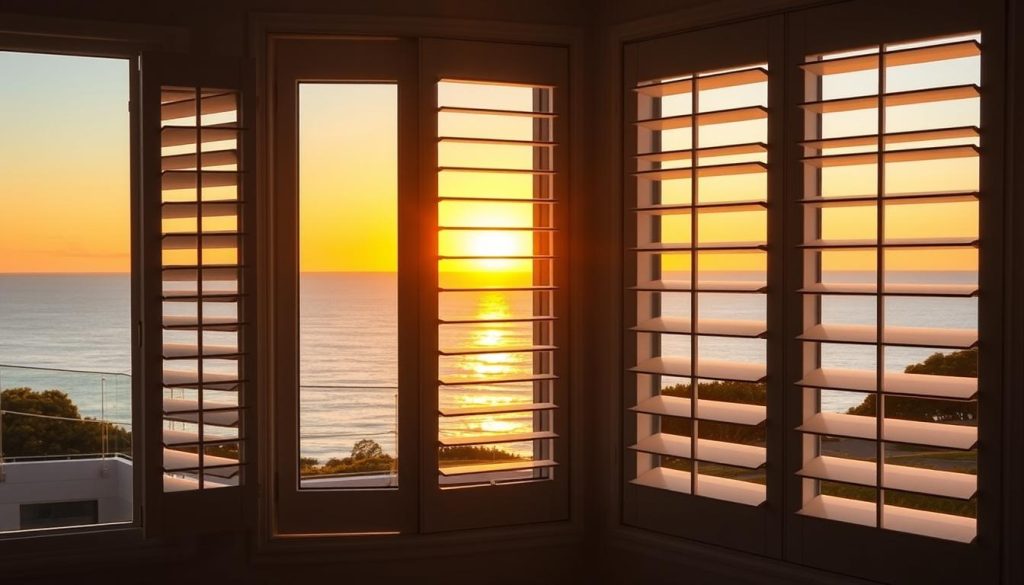
Benefits of Proper Maintenance
- Extended window lifespan (15+ years with proper care)
- Preserved aesthetic appeal and home value
- Improved energy efficiency through proper sealing
- Smooth, reliable operation year-round
- Prevention of costly repairs or premature replacement
Consequences of Neglect
- Accelerated corrosion and structural damage
- Sticking or inoperable windows
- Water leakage during storms
- Unattractive appearance affecting home value
- Premature replacement costs (often within 5-7 years)
Remember that the frequency of maintenance should increase the closer you are to the coastline. Homes within direct salt spray zones (within 500m of the ocean) require the most vigilant care, while those further inland still need regular attention but may follow a less intensive schedule.
Expert Aluminium Louvre Window Maintenance
At Brightview Aluminium, we specialize in maintaining, repairing, and installing high-quality aluminium louvre windows designed specifically for Sydney’s coastal climate. Our marine-grade materials and expert technicians ensure your windows remain beautiful and functional for years to come.